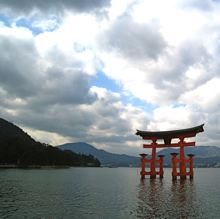Travel News
7.1 Aftershock Rattles Battered Japan, Nuclear Plants Seem Stable For Now
 The country of Japan trembled once more as a magnitude 7.1 earthquake struck off the coast of the ravaged Miyagi Prefecture on Thursday night.
The country of Japan trembled once more as a magnitude 7.1 earthquake struck off the coast of the ravaged Miyagi Prefecture on Thursday night.
Hundreds of locals evacuated their homes along the northern coast after tsunami advisories were issued.
An hour later, the warnings were lifted as no tsunami waves were created by the temblor, which was the strongest of the aftershocks that have followed the magnitude 9.0 quake in March.
In a press conference today, the Tokyo Electric Power Company assured the public that no further damage was done to the crippled Fukushima nuclear power plant.
However, Onagawa nuclear power plant located near the epicenter of the quake was damaged, causing the plant to lose power. The plant’s reactors, however, had not been dependent on the two power lines damaged in the earthquake.
Japan’s Meteorological Agency reported that no increased radiation levels were detected around the Onagawa plant and cooling systems remained online.
Get the latest news on how the international community is assisting Japan in its time of crisis: Japan Disaster Update From The International Red Cross
Yesterday’s quake was followed by a bit of good news as Britain’s Foreign and Commonwealth Office (FCO) has downgraded travel warnings to Japan.
 Today the FCO, dropped its warning against “all but essential” travel to Tokyo.
Today the FCO, dropped its warning against “all but essential” travel to Tokyo.
The decision was a welcome one for the Japanese tourism industry, which depends on cherry-blossom season tourism in the spring.
The FCO previously warned against travel because of fear of radiation reaching Tokyo, which is 130 miles south of Fukushima.
Brits are advised to follow “precautionary measures” if radiation levels become a concern in the Tokyo area.
The U.S. government continues to uphold its advisory that citizens should defer non-essential travel to Tokyo, Yokohama, and several northern prefectures.
By Adriana Padilla for PeterGreenberg.com.
Related Links: Daily Mail (UK), Christian Science Monitor
Related links on PeterGreenberg.com:
- Japan Earthquake Resources: Aid Organizations, Charities and the Travel Industry Response
- Japan Disaster Update From The International Red Cross
- Japan’s Aftershocks: Rebuilding Japanese Tourism
- American Airlines Forges Ahead With Japan Partnership, Other Airlines Cut Capacity
- Japan Tourism Plummets In Wake of Earthquake, Tsunami
- Natural Disasters section
- Japan Travel section












